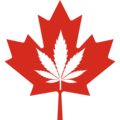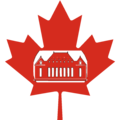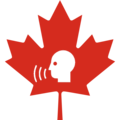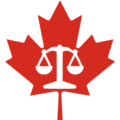Portal:Canada
| Showcase | Contents | Contributing |
Introduction
Canada is a country in North America. Its ten provinces and three territories extend from the Atlantic Ocean to the Pacific Ocean and northward into the Arctic Ocean, making it the world's second-largest country by total area, with the world's longest coastline. Its border with the United States is the world's longest international land border. The country is characterized by a wide range of both meteorologic and geological regions. With a population of just over 41 million people, it has widely varying population densities, with the majority residing in urban areas and large areas of the country being sparsely populated. Canada's capital is Ottawa and its three largest metropolitan areas are Toronto, Montreal, and Vancouver.
A developed country, Canada has a high nominal per capita income globally and its advanced economy ranks among the largest in the world by nominal GDP, relying chiefly upon its abundant natural resources and well-developed international trade networks. Recognized as a middle power, Canada's strong support for multilateralism and internationalism has been closely related to its foreign relations policies of peacekeeping and aid for developing countries. Canada promotes its domestically shared values through participation in multiple international organizations and forums. (Full article...)
Featured article -
The Battle of Quebec (French: Bataille de Québec) was fought on December 31, 1775, between American Continental Army forces and the British defenders of Quebec City early in the American Revolutionary War. The battle was the first major defeat of the war for the Americans, and it came with heavy losses. General Richard Montgomery was killed, Benedict Arnold was wounded, and Daniel Morgan and more than 400 men were taken prisoner. The city's garrison, a motley assortment of regular troops and militia led by Quebec's provincial governor, General Guy Carleton, suffered a small number of casualties. (Full article...)
Current events
- April 3, 2025 – Tariffs in the second Trump administration
- Multinational car manufacturer Stellantis announces it will lay off 900 workers across five of its U.S. factories and will pause production at assembly plants in Canada and Mexico in response to the tariffs. (Reuters)
- April 3, 2025 – Canada convoy protests
- The Ontario Court of Justice in Ontario, Canada, convicts Tamara Lich and Chris Barber, two leaders of the truck driver protest movement against COVID-19 vaccination in Canada, of criminal mischief. (AP)
- April 2, 2025 – Tariffs in the second Trump administration
- China–United States trade war, 2025 United States trade war with Canada and Mexico
- Exceptions include Canada, Cuba, Mexico, North Korea, and Russia. Canada and Mexico had tariffs placed on them in February, while Cuba, North Korea, and Russia are under U.S. sanctions. (BBC News) (France 24) (India Today)
- The United States Senate votes 51–48 on a non-binding resolution to rebuke and reverse tariffs on Canada, with Republicans Rand Paul, Susan Collins, Lisa Murkowski, and Mitch McConnell voting for the resolution. (NPR)
- March 29, 2025 – Protests against Donald Trump
- Protests are held at Tesla dealerships across the United States, Canada, and Europe to protest against DOGE chief and Tesla CEO Elon Musk's role in the second Trump administration. (Taipei Times) (AP)
Selected panorama -
National symbol -

Canada Day, formerly known as Dominion Day, is the national day of Canada. A federal statutory holiday, it celebrates the anniversary of Canadian Confederation which occurred on July 1, 1867, with the passing of the British North America Act, 1867, when the three separate colonies of the United Canadas, Nova Scotia, and New Brunswick were united into a single dominion within the British Empire called Canada. (Full article...)
Selected vital article -

Religion in Canada encompasses a wide range of beliefs and customs that historically has been dominated by Christianity. The constitution of Canada refers to 'God', however Canada has no official church and the government is officially committed to religious pluralism. Freedom of religion in Canada is a constitutionally protected right, allowing individuals to assemble and worship without limitation or interference. Rates of religious adherence have steadily decreased since the 1960s. After having once been central and integral to Canadian culture and daily life, Canada has become a post-Christian state. Although the majority of Canadians consider religion to be unimportant in their daily lives, they still believe in God. The practice of religion is generally considered a private matter throughout society and the state. (Full article...)
Selected picture -
Featured biography -
Louis Alexander Slotin (/ˈsloʊtɪn/ SLOHT-in; 1 December 1910 – 30 May 1946) was a Canadian physicist and chemist who took part in the Manhattan Project. Born and raised in the North End of Winnipeg, Manitoba, Slotin earned both his Bachelor of Science and Master of Science degrees from the University of Manitoba, before obtaining his doctorate in physical chemistry at King's College London in 1936. Afterwards, he joined the University of Chicago as a research associate to help design a cyclotron. (Full article...)
Did you know -

- ... that Oakwood Cemetery contains the graves of Confederate soldiers and officers, English, Canadian, and French World War II pilots, and Hank Williams?
- ... that Ron Tiavaasue was born in Samoa, grew up in New Zealand, played college football in the United States, and now plays professional football in Canada?
- ... that a journalists' poll rated Billy Fitzgerald the second-best Canadian lacrosse player of the first half of the 20th century?
- ... that there's a Little Canada on Minnesota State Highway 36?
- ... that there is an East Quoddy Head Lighthouse and a West Quoddy Head Lighthouse on opposite sides of a bay, but one is in Canada and the other is in the United States?
- ... that the parasitic fossil fungus Paleoserenomyces allenbyensis was named after a Canadian ghost town?
- ... that Ausma Malik is the first hijab-wearing Muslim woman to be elected to public office in Canada?
Featured list -
The Vanier Cup (French: Coupe Vanier) is the trophy awarded annually to the champion Canadian football team in U Sports, the governing body for university sports in Canada. The U Sports football champion is determined in a one-game playoff (the Vanier Cup game), played by the winners of the Uteck Bowl and the Mitchell Bowl. In turn, the participating teams are determined by the winners of four bowl games: the Loney Bowl (AUS), Hardy Cup (Canada West), Dunsmore Cup (RSEQ), and Yates Cup (OUA). The Vanier Cup game is played at a neutral site that changes every year; the hosting university is determined months or years in advance. (Full article...)
Main articles
Associated Wikimedia
The following Wikimedia Foundation sister projects provide more on this subject:
-
Commons
Free media repository -
Wikibooks
Free textbooks and manuals -
Wikidata
Free knowledge base -
Wikinews
Free-content news -
Wikiquote
Collection of quotations -
Wikisource
Free-content library -
Wikiversity
Free learning tools -
Wikivoyage
Free travel guide -
Wiktionary
Dictionary and thesaurus






























